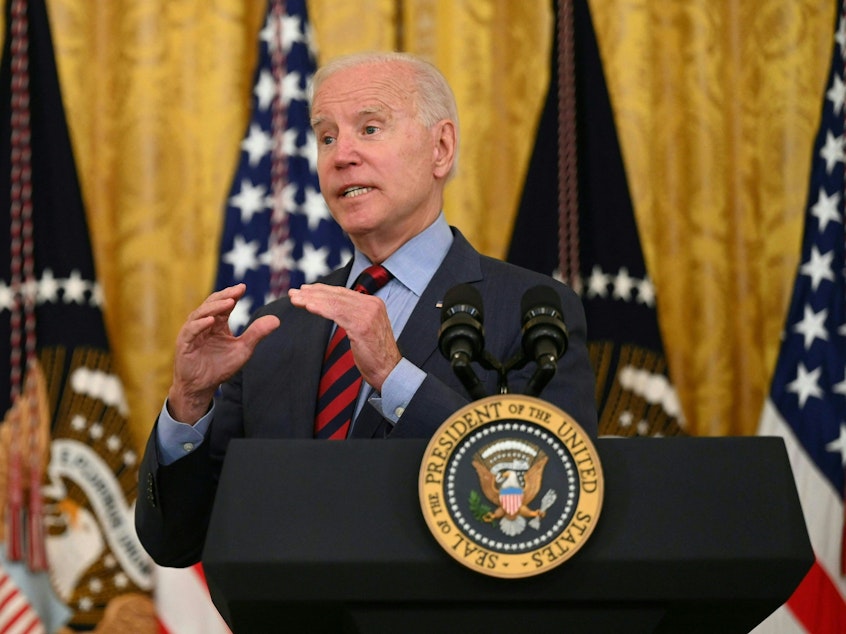The Biden Administration Plans A New Eviction Moratorium After A Federal Ban Lapsed

Updated August 3, 2021 at 5:59 PM ET
Days after a national eviction moratorium expired, the Biden administration plans to announce a more limited freeze on evictions, a source familiar with the decision told NPR on Tuesday.
President Biden said details of the pause would come from the Centers for Disease Control and Prevention later Tuesday.
The source said the new, partial eviction moratorium plan is based on which counties are experiencing "substantial" and "high" spread of the coronavirus.
As of Tuesday afternoon that's the vast majority of U.S. counties.
Sponsored
The federal ban expired Saturday night, affecting millions of Americans who now have the potential to be removed from their homes if they've fallen behind on rent.
Since the moratorium's expiration, progressives have pressured the Biden administration to extend the pause on evictions. The administration previously said it didn't have the legal authority to issue a such a measure.
Gene Sperling, who oversees the White House's rollout of COVID-19 relief, told reporters on Monday that Biden had "quadruple checked" whether he had the legal grounds to unilaterally extend the moratorium but said ultimately, his hands were tied by a Supreme Court ruling that blocked the CDC from extending the moratorium past the end of July. A last-minute effort by Congress to extend the ban failed.
Sperling pushed back against criticism from Democrats on Capitol Hill who argued that the White House should have acted sooner in extending the eviction moratorium. He had noted that the Supreme Court made it clear that "congressional authorization" was needed on the matter.
Sperling added that Biden was asking state and local governments to extend or pass eviction moratoriums themselves and noted there's still billions of dollars in rental assistance aid available.
Sponsored
In remarks to reporters Tuesday afternoon, Biden acknowledged the legal quandary.
"Any call for [a] moratorium based on the Supreme Court's recent decision is likely to face obstacles," he said. "I've indicated to the CDC, I'd like them to look at other alternatives [other] than the one that is in existence, which the court has declared they're not going to allow to continue."
For days, a group of congressional Democrats has argued that the prevalence and severity of the delta variant necessitate the continuation of the moratorium.
Missouri Democratic Rep. Cori Bush, who has been a driving force in the effort to raise awareness about the moratorium's expiration, slept outside the Capitol in protest.
Bush, along with New York Democrat Alexandria Ocasio-Cortez and others, called on their House colleagues to return to Washington after leaving for recess and pushed the White House to step in.
Sponsored
A "largely preventable tragedy"
During his remarks Tuesday, Biden reiterated the danger of the delta variant, noting it now accounts for over 80% of all current coronavirus cases in the U.S.
Calling the current surge a "largely preventable tragedy," the president emphasized that unlike past surges of the virus, "we have the tools to prevent this rise in cases from shutting down our businesses, our schools, our society."
He noted that despite the increase in cases, there has not been a comparable rise in hospitalizations or deaths in most parts of the country, due to the effectiveness of the vaccine.
"We have a pandemic of the unvaccinated," Biden said. "If you're vaccinated, you're highly unlikely to get COVID-19 and even if you do, the chances are you won't show any symptoms and if you do, they'll most likely be very mild. Vaccinated people are almost never hospitalized with COVID-19."
Sponsored
He pointed to Vermont, the most vaccinated state in the country, which he said has seen just five new cases of COVID-19 per day for every 100,000 people who live there.
By contrast, he noted that Florida and Texas — states with lower vaccination rates — account for one-third of all new COVID-19 cases in the entire country.
He urged people to get the vaccine before it's too late.
"Right now, too many people are dying or watching a loved one dying and saying, 'If I just got vaccinated.' " [Copyright 2021 NPR]



